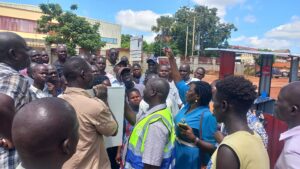
In the relentless quest to address complex challenges in the water and sewerage sector within informal settlements, the National Water Sewerage Corporation (NWSC) has embarked on a synergistic effort with Makerere University rooted in the commitment to research capacity development, aims to create sustainable solutions that resonate with the dynamic nature of urban development challenges.
The partnership between NWSC and Makerere University depicts the corporation’s dedication to real-world problem-solving, particularly in the realm of urban pro-poor services, with a primary focus on water and sanitation. By investing in and empowering PhD researchers in Uganda, NWSC is contributing significantly to the progress of knowledge and society.
According to Mr. John Bosco Otema, the Manager of Pro-Poor Services and Community collaboration, NWSC’s urban pro-poor branch in Kisenyi has made substantial progress since its initiation in 2006. The coverage has expanded to 75% of informal settlements across Kampala, positively impacting areas like Bwaise, Namuwongo, Katanga, Kagugube, and more.
Expanding pro-poor initiatives, such as water point provisions and revised water tariffs, directly influences the lives of residents in these areas. However, NWSC acknowledges the complexities they face, including challenges like a predominant tenant population, the need for continuous policy evaluation, and financial constraints.
To address these challenges comprehensively, a collaborative team from Makerere University, led by Professor Dauda Waiswa, and including Ms. Pamela Ajok, a civil engineering student, recently convened at NWSC’s Jinja road offices, and the administrative discussions aimed to develop holistic and sustainable solutions that align with the dynamic nature of urban development challenges.
It is in order to say that it is laudable that NWSC is committed to ensuring clean and safe water for people in informal settlements as the corporation has pledged to provide clean and affordable water to vulnerable populations, exemplified by the strategic transition from public standpipes to pre-paid meters. This move addresses challenges such as the exploitation of vulnerable populations by middlemen.
Noteworthy is NWSC’s proactive approach in creating resilient and healthy urban environments, for instance the construction of sewerage treatment facilities in areas practicing on-site sanitation which accelerates better public health, environmental sustainability, and community well-being.
Professor Dauda expressed gratitude for NWSC’s support and emphasized the importance of collaboration between academic institutions and service delivery organizations. Whereas the Branch Manager-Urban Pro Poor (UPP), Ms. Evelyn Mukajusi stated that NWSC’s commitment to research aligns with corporate social responsibility
Simply put, in navigating the complexities of service delivery in dynamic environments, NWSC adopts an adaptive approach to respond promptly to emerging challenges, opportunities, and expectations within the communities it serves, just like in the case of the Urban Pro-Poor realm.


